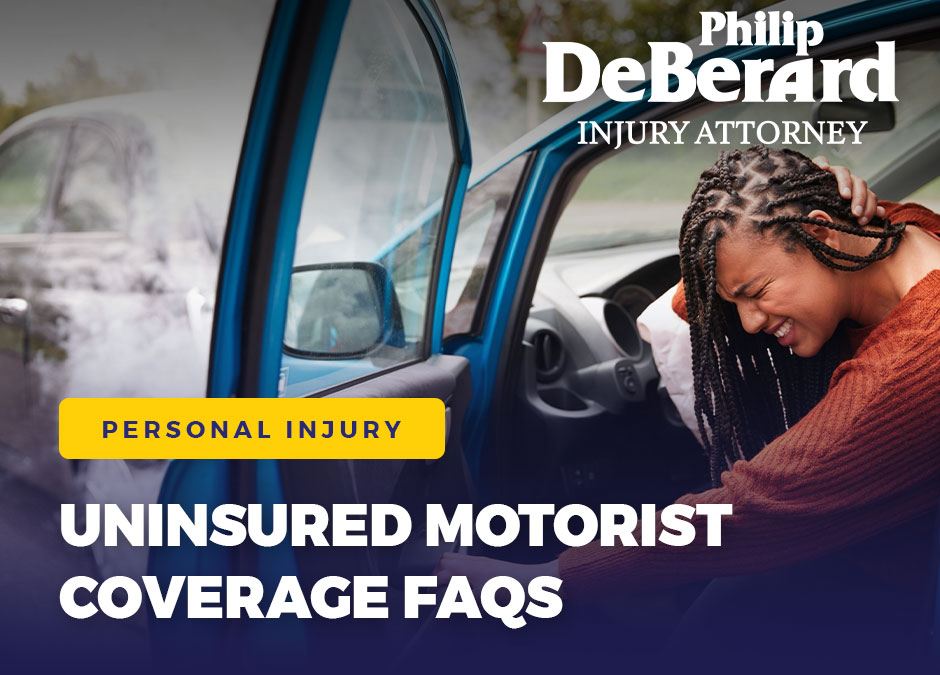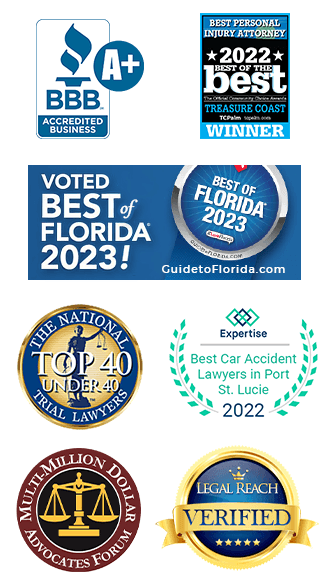Uninsured motorist insurance coverage, commonly known as UM, is an optional auto insurance coverage in Florida. Many drivers opt to purchase this coverage and find that it is crucial in certain accidents. Here’s a comprehensive guide on how UM insurance works in Florida, why you may need it, and how to get compensated from it.
Sidenote: You may find the following articles to be helpful: Why Uninsured Motorist Coverage is Essential for Floridians and How A Costco Slip and Fall Accident Lawyer in Florida Can Help Get You The Compensation You Need.
What is Florida uninsured motorist coverage? How does it work?
Uninsured motorist coverage (UM) in Florida is a type of insurance coverage that protects you in case an uninsured driver causes a car accident with you. This coverage will also apply if you get injured in a hit-and-run collision. In either scenario, the at-fault driver won’t be able to pay for your crash injuries, so you’ll seek compensation from your own insurance instead.
You can claim from your UM policy once you’ve exhausted your Personal Injury Protection (PIP) coverage. This is often useful in cases involving serious injuries, where costs exceed PIP coverage limits.
Alongside uninsured coverage, underinsured motorist coverage (UIM) is a related offering from insurance companies. This works similarly to UM but applies if the at-fault driver has inadequate insurance to pay for all your expenses. Together, uninsured and underinsured motorist insurance are just referred to as UM.
What does Florida uninsured motorist coverage cover?
UM coverage in Florida helps pay for the losses you suffer after a car accident caused by an uninsured driver. There are two main components of UM coverage: UMBI, which covers your bodily injury and related costs, and UMPD, which covers your property damage. Losses covered by a UMBI policy may include:
- Medical expenses (past, present, and future bills can be included)
- Disability costs
- Lost wages
- Diminished earning potential
- Pain and suffering
- Wrongful death (if a loved one died in the crash).
Most UM policies in Florida cover you as the policyholder, as well as your family members in the same household and your passengers at the time of the crash.
Further, UM insurance “follows” insured persons, not the car. This means that you (and your loved ones) are always covered by your purchased UM coverage, even if you get in a vehicle accident elsewhere. You are covered even as a passenger in someone else’s car, as a bicyclist hit by a motorist, or as a pedestrian hit by a vehicle, for instance.
What’s the difference between UM and PIP coverage?
Personal injury protection (PIP) is an insurance coverage that’s required for all Florida drivers. It is the first coverage you’ll claim from if you get injured in any car accident, whether the at-fault driver is insured or not. On the other hand, uninsured motorist (UM) is an optional coverage that only kicks in if the at-fault driver is uninsured or missing. You may claim from UM only after you’ve maxed out your PIP coverage first.
What’s the difference between UM and BI coverage?
The main difference between uninsured motorist coverage (UM) and bodily injury liability coverage (BI) is who they pay for. UM insurance pays for your own injuries and related damages after a crash with an uninsured driver. On the other hand, BI liability coverage pays for other people’s injuries that you caused in a crash. Both policies, however, are optional in Florida.
What are the UM limits in Florida?
The minimum UM coverage limits in Florida are $10,000 per person and $20,000 per accident (often referred to as 10/20). You may increase your coverage limits through a corresponding increase in your premium.
Another way to raise your UM coverage limits is to “stack” them. For example, if you have two cars each with a UM limit of $10,000 per person, you may stack those limits for a total coverage of $20,000 per person.
Do I need UM coverage in Florida?
UM coverage is not required in Florida but many people end up needing it. This is because Florida is full of uninsured motorists, and each of them could cause a costly collision they can’t pay for.
According to a 2023 insurance survey, Florida has the sixth-highest uninsured motorist rate in the US. Over 20 percent of motorists in the state lack insurance – that’s about 3.7 million uninsured drivers sharing our roads. If you get injured by one of these uninsured motorists, you’ll likely need your own UM coverage to fully compensate you.
Should I decline uninsured motorist coverage in Florida?
Not if you want to have an important layer of protection in serious accidents. In our four decades of experience at the DeBerard firm, we find that the only benefit of declining UM coverage is that it would mean a slightly lower premium. But that would hardly matter in the event you get severely injured in a collision. In this case, you’ll need UM insurance to help pay for the mountain of expenses that surely follow.
Do I need uninsured motorist coverage in Florida if I have Medicare?
Yes, you may need uninsured motorist coverage in Florida even if you have Medicare or other health insurance policies. Here’s why:
- Health insurance typically pays only for medical bills. UM coverage, on the other hand, includes non-medical expenses such as your lost income, pain and suffering, and disability needs.
- Most health insurance policies, including Medicare, require you to shoulder out-of-pocket costs like deductibles and copays. On the other hand, with UM bodily injury coverage, there is typically no deductible.
For these reasons, some injured individuals choose to fall back on their UM coverage first even if they have health care coverage.
Do I need uninsured motorist coverage in Florida if I have PIP?
You may need UM coverage even if you have Personal Injury Protection (PIP) coverage. Florida requires drivers to carry PIP, which is the first coverage you’ll turn to for compensation. However, PIP is often insufficient to pay for your accident costs, especially if your injuries are severe. When you’ve exhausted your PIP coverage, you can then claim additional payments from your UM coverage.
What happens if I get hit by an uninsured driver in Florida?
If you get injured by an uninsured driver in Florida, you have several options to get compensated. First, you’ll claim from your own Personal Injury Protection (PIP) policy, which is required for Florida motorists.
Ideally, you have adequate PIP coverage to pay for all your accident costs, but this doesn’t always happen in reality. Numerous injury accidents result in expenses that exceed the victim’s PIP limits. In such a case, you’ll need to turn to your other applicable insurance policies to pay for the excess costs.
Uninsured motorist coverage is one such policy. If you’ve purchased this optional coverage, it would help you greatly in dealing with your crash-related expenses. However, if you do not have UM coverage, you’ll have to explore other insurance options like your health care coverage.
Another option you may consider is filing a personal injury lawsuit against the at-fault driver. If your lawsuit is successful, you’ll get a court award that orders the at-fault person to pay you a certain amount. Unfortunately, drivers who do not have insurance may also have insufficient resources to pay the award. In this case, the driver would owe you money and you’d have to deal with being a creditor.
As you can see, there are many legal pathways to recover your damages after a collision with an insured driver. However, it takes legal understanding to determine which remedy is best for your situation. Don’t hesitate to speak with Philip DeBerard, Injury Attorney for sound legal guidance.
What happens if the person at fault in an accident has no insurance in Florida?
Florida follows the “no-fault” principle in auto insurance. This means it doesn’t matter who was at fault in the crash – you’ll claim from your own PIP insurer as your first recourse. Only when you’ve used up your PIP coverage will you turn to other sources of compensation.
Normally, the next source of compensation would be the negligent driver who hit you. But if that driver is uninsured or underinsured, you’ll need other insurance options such as your own UM coverage.
What is the penalty for an uninsured motorist in Florida?
In Florida, driving without insurance is punishable with fees and a driving suspension. First-time offenders may face suspension of up to three years, with a $150 fee for reinstatement. If there’s a second violation within three years, the reinstatement fee goes up to $250. For a subsequent violation, the fee climbs to $500.
Can you sue an uninsured motorist in Florida?
Yes, you have the option to sue an uninsured motorist who injured you in Florida. For this, you’ll file a personal injury lawsuit. A successful lawsuit will award you with an amount of money that the negligent motorist will have to pay. They may pay out of pocket or through debt options.
What is the statute of limitations for UM claim in Florida?
The statute of limitations is the law that sets a time limit for filing a lawsuit. In Florida, the statute of limitations for personal injury cases is two years from the date of injury. (Previously, the time frame was four years, but legislation was changed in 2023.)
There’s another type of lawsuit that may be relevant if you’re trying to claim from your UM policy. If the UM insurance company is not treating you fairly – perhaps by denying your claim for no reason – you may have grounds to sue them. This lawsuit would be under contract law, outside of personal injury law. The Florida statute of limitations for this is five years.
It can get quickly complicated to seek compensation after an uninsured driver injures you. Know that you don’t have to go it alone. Get the advice and representation of an injury lawyer to help you succeed in pursuing the compensation you deserve.
Talk to Philip DeBerard, Injury Lawyer in Florida
The personal injury firm of Philip DeBerard is highly trusted in South Florida and has been voted number 1 on the Treasure Coast. With more than 40 years of experience, we bring invaluable knowledge and strategy to help you receive your maximum compensation.
Schedule a free consultation with Philip DeBerard, Injury Lawyer. Call 1-800-299-8878 today.





